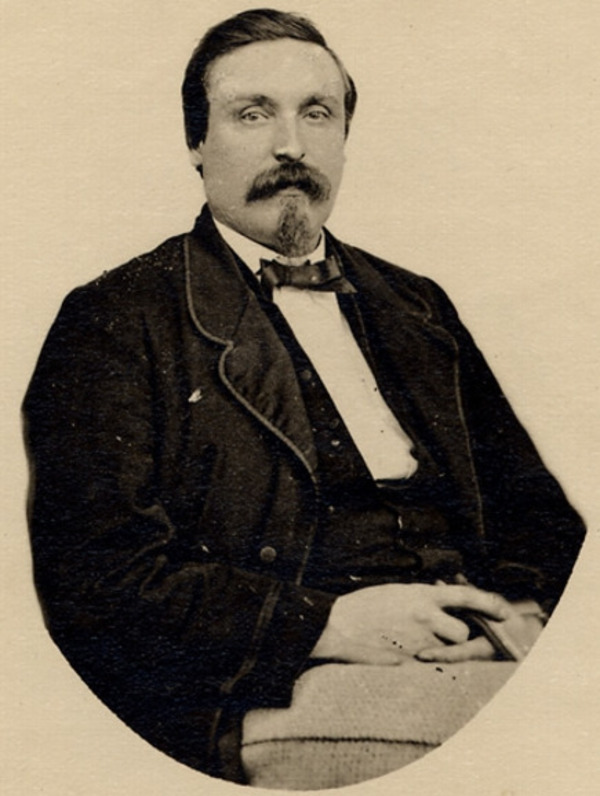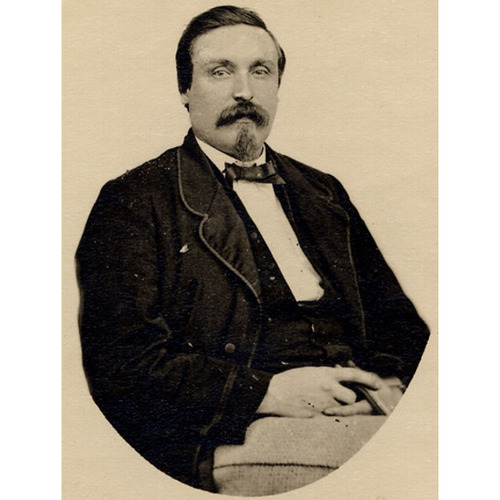
Source: Link
LAVIGUEUR, CÉLESTIN (baptized Jean-Célestin), musician and composer; b. 19 Jan. 1831 at Quebec City, son of Jean Delage, dit Lavigueur, and Marguerite Douglass; d. 11 Dec. 1885 at Lowell, Mass.
Célestin Lavigueur showed a talent for music at an early age and seems to have devoted himself entirely to studying it after he terminated his classical studies at the end of his second year at the Petit Séminaire de Québec. Although introduced to the violin through lessons from notary François Huot, Lavigueur quickly acquired the essential musical skills by himself. He gave violin recitals in salons and musical groups, and at 22 his reputation earned him an invitation to the Petit Séminaire de Québec, where he taught piano, violin, and wind instruments from 1853 to 1881. He also did keyboard and orchestral arrangements for the seminary band.
Lavigueur enjoyed considerable success as a concert artist. The public was charmed immediately by his tall, elegant figure, and by the magnetism he exuded from the moment his bow touched the strings. Critics did not hesitate to call this musician who had acquired an ability to play in a stirring and engaging fashion a genius. With Marie-Hippolyte-Antoine Dessane* he organized concerts in which both performed. His repertoire, as was common in the province of Quebec at the time, probably consisted mostly of airs transcribed from Rossini, Donizetti, or Meyerbeer; to these he occasionally added works of his own composition.
A self-taught composer, Lavigueur usually wrote songs for specific occasions. “La huronne,” like “Au Canada, beau pays, ma patrie,” was intended for patriotic celebrations and “Donnez” gave an invitation to assist the victims of the fire that devastated the wards of Saint-Roch and Saint-Sauveur in Quebec City in 1866. “Pas de Thibault, c’est Laurier qu’il nous faut,” a political song, supported the cause of Wilfrid Laurier* in the 1877 federal election in the county of Quebec East. Lavigueur also composed a sentimental song, “Soyez les bienvenus,” dedicated to the Marquess of Lorne [Campbell*] and his wife Princess Louise*, as well as others such as “Amour,” “Thérèse la blonde,” “Le petit ramoneur,” “Le nom de sa sœur,” and “La fauvette du canton.” He wrote three operas, which were favourably received by the Quebec public: La fiancée des bois was based on a text by Léon-Pamphile Le May*; for Un mariage improvisé and Les enfants du manoir he himself wrote the libretti.
In 1881, at the invitation of one of his sons, Lavigueur settled with his family in Lowell. No doubt he hoped to find more opportunities there to use his gifts, and perhaps he was seeking material security as were so many other musicians emigrating from Quebec at that time. His Franco-American compatriots did have the chance to enjoy his work, but death caught him in mid career putting the finishing touches to his opera Les enfants du manoir.
Lavigueur had married Mary Childs of Quebec on 19 Jan. 1863, and they had four children, including Émile, a violinist, and Henri-Edgar*, who was mayor and mp of the city of Quebec. Lavigueur’s contemporaries have described him as impressionable, gentle, and above all sensitive to the beauty of nature and the poetry of life. It was probably his enthusiasm and artistic sincerity that brought this self-taught man his great public acclaim and the honour of being elected to the Académie des Muses Santones of France in 1885.
ANQ-Q, État civil, Catholiques, Saint-Roch (Québec), 20 janv. 1831, 19 janv. 1863. ASQ, Fichier des anciens; mss, 433; Séminaire. 183, nos.5e, 5j, 6b, 10a. Canadian Music Library Assoc., A bio-bibliographical finding list of Canadian musicians and those who have contributed to music in Canada (Ottawa, [1961]). Catalogue of Canadian composers, ed. Helmut Kallmann (2nd ed., Toronto, 1952; repr. St Clair Shores, Mich., 1972), 151. Dictionnaire biographique des musiciens canadiens (2e éd., Lachine, Qué., 1935). Grove’s dictionary of music and musicians (5th ed., ed. Eric Blom, 9v. and 1 suppl., London, 1954–61), V: 89. Helmut Kallmann, A history of music in Canada, 1534–1914 (Toronto and London, 1960), 93. Nazaire Levasseur, “Musique et musiciens à Québec,” La Musique (Québec), 1 (1919): 111; 2 (1920): 47, 50, 186; 3 (1921): 98–100; 4 (1922): 143. Antoine Roy, “Célestin Lavigueur,” BRH, 38 (1932): 710–12.
Cite This Article
Antoine Bouchard, “LAVIGUEUR, CÉLESTIN (baptized Jean-Célestin),” in Dictionary of Canadian Biography, vol. 11, University of Toronto/Université Laval, 2003–, accessed December 12, 2025, https://www.biographi.ca/en/bio/lavigueur_celestin_11E.html.
The citation above shows the format for footnotes and endnotes according to the Chicago manual of style (16th edition). Information to be used in other citation formats:
| Permalink: | https://www.biographi.ca/en/bio/lavigueur_celestin_11E.html |
| Author of Article: | Antoine Bouchard |
| Title of Article: | LAVIGUEUR, CÉLESTIN (baptized Jean-Célestin) |
| Publication Name: | Dictionary of Canadian Biography, vol. 11 |
| Publisher: | University of Toronto/Université Laval |
| Year of publication: | 1982 |
| Year of revision: | 1982 |
| Access Date: | December 12, 2025 |



